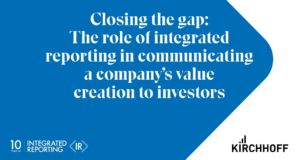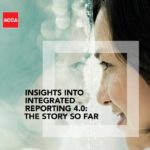
In cooperation with Kirchhoff Consult AG, the International Integrated Reporting Council (IIRC) has investigated the extent to which investors and analysts value non-financial information, the ways they use it and the benefits they see from integrated reporting. The question of how to stimulate increased reporting of non-financial information by companies in Germany in an integrated way has also been examined. The study is based on interviews with investors from Germany, but the insights are equally relevant internationally – for investors and companies alike.
The study shows a clear interest and appreciation by investors of all kinds for non-financial information that ultimately translates into financial impact and metrics. This applies to non-financial information in various areas, including business models, governance, strategy and market trends, but also to natural, human and social capital
This information helps investors to screen companies in or out of their portfolios, even beyond products that are explicitly geared towards sustainability, and also goes into the valuation of the target companies, for instance in classic DCF valuation models. For example, investments required in the future to adapt the business model to changing social or climatic conditions may reduce the cash flows of future fiscal years, while weak governance, for example, may reduce the value of the calculation through higher discount rates.
Heterogeneous investors interviewed
For the study, interviews were conducted with 12 institutional investors. The investments houses they represent have assets under management for clients worth more than 1.4 trillion €. The investors come from German-speaking countries (11 from Germany, one from Switzerland) and have very different roles in their companies. They include buy-side and sell-side investors as well as risk management specialists. Some of them represent global financial service providers, while others represent family offices or investment or valuation consultancies. Some of them have a mainstream focus, while others are active in ESG or as impact investors. The interviews covered the types, usage patterns and sources of non-financial information, as well as useful characteristics of reports containing non-financial information, the benefits of integrated reporting and ways to further disseminate it.
Corporate reports an important source of information – yet with deficits
Depending on the orientation of investors, the main sources of non-financial information are third-party databases and ratings, as well as reporting by, and direct exchange with, companies. It is important for the use of information that the information provided is material, relevant, reliable, comparable and consistent over time. In particular, however, investors are looking for connectivity between the different types of information, especially links between non-financial information and the financials.
The latter in particular is hard to find in corporate reports at present in Germany, according to the investors’ assessment. Integrated reporting could help to provide the required information in a useful format that links non-financial and financial results. From the IIRC’s framework for integrated reporting respondents particularly appreciate the emphasis on the business model and its acknowledgement of different forms of capital to reflect the value of the company, but also the connectivity of information, the long-term focus and integrated thinking that results from adopting integrated reporting.
Integrated reporting uncommon in Germany
In contrast to various other countries, the uptake of this form of reporting in Germany has been limited to date. According to the interviewees, this could be changed by increased pressure on companies due to rising demand from investors, as well as by further development of relevant regulations and standards, especially at the international level, as is currently happening in the EU.
“The step towards integrated reporting is not too big a one for companies in Germany,” explains Klaus Rainer Kirchhoff, founder and CEO of Kirchhoff Consult. “They are building on comprehensive and mature reporting – especially when compared internationally. In particular, it is important to highlight the links between non-financial information and its ultimate financial impact.”
Building trust with reporting
This could help investors to understand the risks and opportunities they face and generate greater trust in their potential performance – and thus the value of the company. “Building and strengthening investors’ trust in companies has always been a core task of reporting. It is encouraging to see investor behaviour evolving to take into account broader value drivers, in Germany and internationally, and we will continue to work with businesses to ensure this information is robust, effective and comparable,” emphasizes Charles Tilley, CEO of the IIRC.
Download the study report (pdf)



